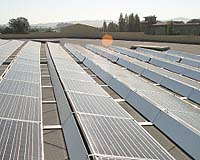 |
Honolulu (UPI) Feb 5, 2009 Hawaiian officials have concluded that the resource-rich tropical state has little choice but to pursue green ambitions, reports the Los Angeles Times. Their goal is to transform the nation's most energy-dependent state into its cleanest and most sustainable. Hawaii aims to obtain 70 percent of its energy needs from clean sources within 20 years. According to government figures, Hawaii now imports some 51 million barrels of oil at an annual cost of billions of dollars. Because it doesn't produce any crude oil, the state is particularly vulnerable to the effects of spills, price swings and geopolitics. It depends almost entirely on oil for power plants, and its residents are currently subject to the highest pump prices and electricity rates in the United States. "We're adopting policies and technologies here that can serve as a model for the rest of the globe," Jeff Mikulina, executive director of the Blue Planet Foundation, a Hawaii clean energy advocacy group, told the Times. As part of the Hawaii Clean Energy Initiative agreement signed with the Department of Energy in 2008, Hawaii pledged to obtain 40 percent of its total energy needs from renewable electricity generation and the remaining 30 percent from energy efficiency. Beginning this year Hawaii requires that all new homes be equipped with solar water heaters. And the state's public utilities commission is devising a compensation scheme to encourage homeowners and businesses to switch to solar. Green achievements in Hawaii include The Gas Company's use of municipal solid waste and animal fat to make synthetic natural gas, the Times reports. Another company is aiming to provide air conditioning in 40 downtown Honolulu buildings using cold seawater pumped from 3 miles out in the ocean. With a population of just 1.3 million, Hawaii's energy consumption dwarfs that of other states. But experts say its small size and unique geography works to Hawaii's advantage in its race for energy independence. The islands are rich in solar, wind, geothermal and wave resources. "If Saudi Arabia is rich in oil, you could use the analogy that Hawaii is rich in renewable resources," said Will Rolston, energy coordinator for the County of Hawaii, which comprises the state's Big Island. Current research at the lab includes studies on ocean thermal energy conversion, a process that generates electricity by exploiting temperature differences between deep and shallow layers of seawater. The lab is also a showcase for seawater air conditioning. Because Hawaiians already pay steep energy prices, they are not so likely to oppose the cost of renewables, experts say. But a survey by the Blue Planet Foundation found that residents rated energy independence behind other key issues including jobs, healthcare and traffic congestion, the Times reports.
Share This Article With Planet Earth
Related Links All About Solar Energy at SolarDaily.com
 Plans Announced To Develop 10MW Rooftop Solar Portfolio
Plans Announced To Develop 10MW Rooftop Solar PortfolioRochester Hills MI (SPX) Feb 02, 2010 Energy Conversion Devices and Enfinity has announced plans to collaborate on the development of a 10MW portfolio of rooftop solar installations in Ontario, Canada. ECD and Enfinity will partner to co-develop a series of rooftop solar projects throughout Ontario, Canada under the province's new feed-in-tariff program. The companies expect to complete construction of approximately 10MW of pr ... read more |
|
| The content herein, unless otherwise known to be public domain, are Copyright 1995-2010 - SpaceDaily. AFP and UPI Wire Stories are copyright Agence France-Presse and United Press International. ESA Portal Reports are copyright European Space Agency. All NASA sourced material is public domain. Additional copyrights may apply in whole or part to other bona fide parties. Advertising does not imply endorsement,agreement or approval of any opinions, statements or information provided by SpaceDaily on any Web page published or hosted by SpaceDaily. Privacy Statement |